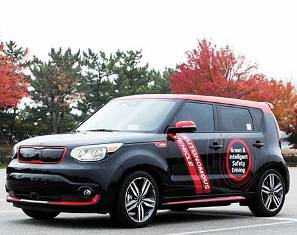Following the footsteps of automakers like Honda and BMW, South Korean automaker Kia has announced that the company will introduce partially-autonomous driving technologies by 2020, followed by the introduction of fully-autonomous cars by 2030.

The company will be investing around $2bn by 2018 towards the development of Advanced Driver Assistance System (ADAS) technologies and getting more man power.
The company has already started working with Hyundai Motor on a new set of technologies including 'Recognition' technology which includes sensors designed to detect other vehicles and hazards, and to analyze the road ahead and identify poor driving conditions.
Kia is also working on 'Judgment' tech that will gather information from ADAS and make driving decisions and it will also give control to the driver to take charge of the vehicle in a tricky situation.
The company is also working on Lane Guidance System (LGS), Advanced Smart Cruise Control (ASCC), Traffic Jam Assist (TJA) function, Smart Parking Assist System (SPAS), as well as Remote Advanced Parking Assist System (RAPAS).
These are some of the systems that automakers like Volvo, BMW, Daimler and tech giant Google have already introduced in their self driving cars.
Hyundai Motor Central Advanced Research and Engineering Institute vice president Tae-Won Lim said: "Fully-autonomous vehicles are still some way off, and a great deal of research and rigorous product testing will need to be carried out to make the 'self-driving car' a reality.
"Kia is still in the early stages of developing its own technologies, and we are confident that the latest innovations - both partially and fully autonomous - will ultimately make driving safer for everyone."
The company said that it is focusing R&D resources on vehicle-to-vehicle (V2V), vehicle-to-infrastructure (V2I) and vehicle-to-everything (V2X) communication.
Image:Kia Motors to introduce first autonomous driving technologies by 2020. Photo: courtesy of Hyundai Motor Group.





